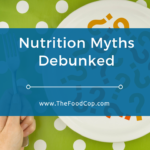Nutrition Myths Debunked
(This web page contains affiliate links.)
Nutrition myths have been bouncing around the media for years, but are these myths accurate? How do you know what to believe and what not to believe? Time to set the facts straight and debunk some of these nutrition myths…
Myth: Eating before bedtime causes weight gain.
Regardless of what time of day you eat, calories and fat have the same effect on the body – your body will store extra calories as fat. What does make a difference is what you eat, how much you eat, and the amount of exercise you engage in on a regular basis.
Myth: Low-fat or fat-free means there are no calories.
Food items that are labeled as low-fat and fat-free are often lower in calories than the same portion size of the full-fat product. However, many processed low-fat and fat-free food items contain just as many, if not more, calories as the full-fat versions of the same foods. They may also contain added sugar, flour, or starch thickeners that help improve the flavor and texture once the fat is removed. These ingredients also add calories to food. Learn more about food labeling tricks made by food manufacturers!
Myth: A normal body weight is a sign of a healthy individual.
A person’s body weight is one of many factors used to determine whether an individual is healthy. Note that the weight on a scale consists of two items: (1) body fat (adipose tissue), and (2) fat-free weight (all of the body’s weight excluding fat – muscle, bones, blood, organs, etc.). Standard scales do not determine what one’s body fat percentage is – body fat percentage is the percentage of total body weight that is carried as fat. Note that muscle weighs more than fat, so if you see the number on the scale inching up, you may be gaining muscle and not fat. Some people use the Body Mass Index (BMI) as a way to measure their body fat; however, BMI is just a relationship between a person’s height and weight. The best way to measure your body fat percentage is to use body fat calipers. I use these body fat calipers from Accu-Measure. Learn more about the difference between body fat percentage and body weight!
Myth: Eating sugar can cause diabetes.
Diabetes is not caused by the amount of sugar an individual consumes, but by a lack of insulin in the body. Because foods that are high in sugar are often high in calories, consuming too many of these types of foods can lead to weight gain. This in turn leads to an increased risk of developing diabetes.
Myth: Fresh fruits and vegetables are healthier than frozen or canned.
Research shows that frozen and canned fruits and vegetables are just as nutritious as fresh. Because frozen fruits and vegetables are usually processed within hours of being harvested, their vitamins and minerals are able to be preserved. Note that raw produce can sometimes spend several days in transit or in storage prior to them being consumed, losing important nutrients during this time.
Myth: Eating carbohydrates causes weight gain.
Weight gain is caused by calories and fat, not carbohydrates. Excess carbohydrates are not any more fattening than calories, regardless of where they come from. Note that fat contains nine calories per gram of fat, whereas carbohydrates contain only four calories per gram of carbohydrate. Many people don’t realize that most of their energy comes from carbohydrate consumption, making carbohydrates a vital part of their meal plan.
Myth: Fad diets are a safe way to lose weight quickly.
Many fad diets are developed by people with no science or health background. Therefore, many of these diets are considered to be harmful to people, especially those with underlying health problems. Many fad diets tend to over-emphasize one particular food item, or type of food, which contradict the guidelines for healthy eating. Skipping meals is not a safe way to lose weight either, as people who skip meals tend to feel hungrier later on, and then eat more than they normally would. Remember, if it sounds too good to be true, it probably is! Meal planning is a great way to lose weight in a healthy manner!
There are lots of nutrition myths floating around besides the ones discussed here, and new nutrition myths are popping up all the time. Some of them can even be dangerous to someone’s health if followed too closely, making it even more imperative to debunk nutrition myths. It’s very important to pay attention to who is providing the nutrition and health information you read, including an individual’s qualifications.



Many contradictory statements are supported by many people. People told me not to eat sugar and bread, but I'm at 120 pounds … that's all I want to eat most of the time. Where as the way people tell me to eat, I feel depressed, more desire for sweets and bread. If I eat too much sugar and bread, I want to eat different foods.
Dreambox Remote: It is important that you consume food from every food group in order to get all of the vitamins and minerals that help keep you healthy. Feel free to contact me at info@thefoodcop.com for any specific questions you might have.